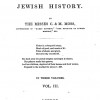
Karen Weisman, “Anglo-Jewish Culture and the Condition of England: The Poetry of Marion and Celia Moss”
In 1839, two young Jewish women poets, Marion and Celia Moss, published their first volume of poetry, Early Efforts. It is a volume laden with multiple—and often mutually contradictory—presentations of subjectivity, many of them relating to their Jewish authors’ consideration of England as a nation, an idea, and as an anchor for identity. 1839 also marks the publication date of Thomas Carlyle’s pamphlet, Chartism, in which he invoked “the condition of England question,” a phrase he coined to elucidate his dismay at the plight of the working classes and the consequent upheavals which were then roiling the nation. In bringing these two publications together under the rubric of this essay, I am hoping to shed light on some aspects of the context for Anglo-Jewish Romanticism, especially as it affects the self-understanding of its authors. Our consideration of the condition of England provides a forum in which to understand not only the grounds for agitation on the part of the disenfranchised but also the self-contradictory positions about the idea of England itself taken up with remarkable poignancy by the Mosses in their poetry. In so far as the stability of English identity depends, in part, on the cultural reification of hearth and home within the wider confines of the landscape, basic questions arise about the quotidian reality of English subjects: whose hearth, whose home, whose valorized landscape? These are the questions for the champions of disenfranchised industrial workers no less than for Jewish authors struggling to define an identity within an England which for its Jewish population has been, at turns (and sometimes simultaneously), alienating, sheltering, dismissive, grudgingly tolerant. I appropriate Carlyle’s questions of 1839 as a springboard into a discussion of the Moss poets’ volume of 1839, and its vexed reflections on their experience of England’s condition.
